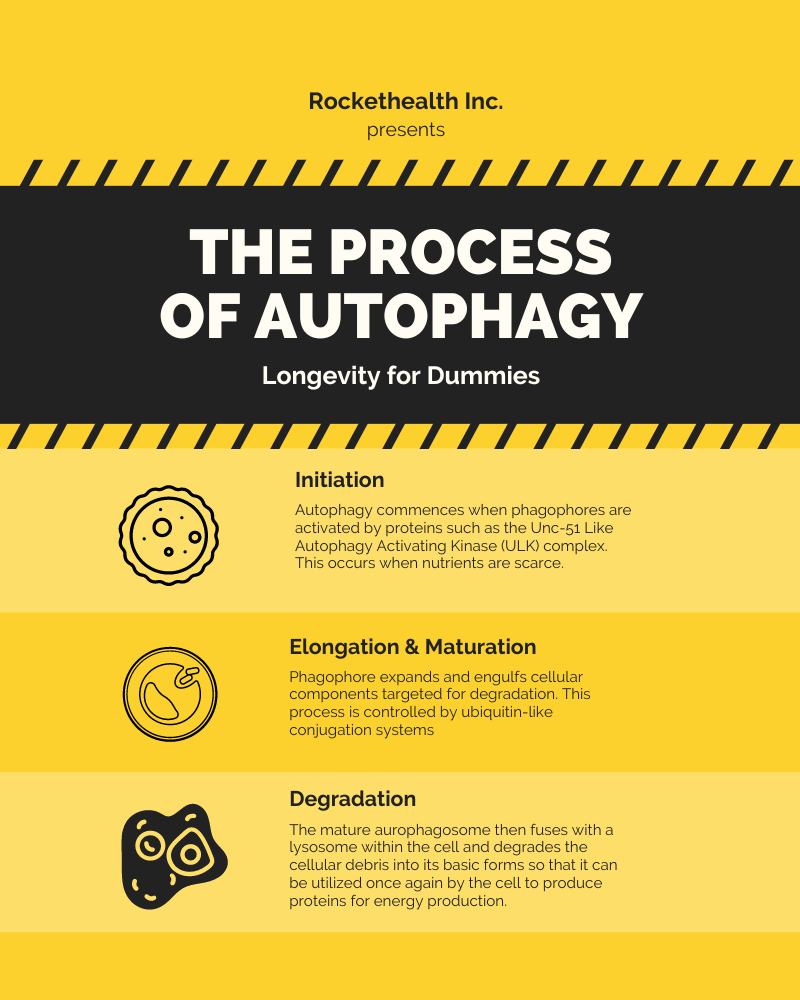Your Weekend Read: Autophagy - A Cellular Process that Can Be Harnessed for Longevity
Your doctor sounds like a broken record when they advice you to "diet and exercise". Here's why.
In the complex world of our bodies, one process stands out as a key player in maintaining health and promoting longevity: autophagy. Derived from the Greek words for "self" and "eating," autophagy is our cells' recycling program, breaking down worn-out parts to provide building blocks for fresh components. It's an elegant housekeeping system that maintains cellular health, and, as we're finding out, plays a key role in overall healthspan and longevity.
Scientists have linked problems in autophagy to a host of issues from neurodegenerative diseases like Alzheimer's to aging itself. In the case of aging, think of autophagy as a key factor in quality control. If this process slows down or becomes less efficient, our cellular machinery can get cluttered with debris, leading to decreased performance over time, much like a car with a faltering maintenance schedule.
Remarkably, studies have found that boosting autophagy can extend lifespan in various organisms. For example, overexpression of certain proteins linked to autophagy, such as sirtuins, has been associated with increased lifespan in organisms ranging from yeast to mammals. Sirtuins, often dubbed "longevity genes," are proteins that help regulate cellular health and have a positive effect on lifespan. They act as the orchestra conductors, directing our cells to ramp up autophagy when energy is low.
Moreover, some familiar interventions are now recognized as potent activators of autophagy and have been linked to improved health and longevity. Exercise, for instance, not only makes us physically fit but also tunes our cellular machinery via autophagy. It's like hitting the gym at the cellular level, where the result is not bigger biceps, but healthier, more efficient cells.
Dietary interventions, such as calorie restriction and intermittent fasting, also stimulate autophagy. When food intake is reduced, our bodies react to the perceived shortage of nutrients by turning on autophagy, helping cells become more efficient and resilient.
Pharmaceuticals like Metformin, a diabetes medication, and natural compounds like Resveratrol found in red wine, have also been found to enhance autophagy, although their use for this purpose needs more research.
Understanding and harnessing the power of autophagy can open up new avenues to improve human health and extend lifespan. By treating our cells to regular cleanup and maintenance, we might be able to enjoy not just more years to our life, but more life to our years.
As our understanding of this vital process grows, the dream of a 'longevity pill' that can slow down aging is becoming more tangible. However, until such a breakthrough, practicing a healthy lifestyle—exercise, a balanced diet, and good sleep—is still our best bet in boosting autophagy and achieving a healthy, long life.
Pathophysiology of Autophagy
Autophagy is a fundamental cellular process that involves the degradation and recycling of cellular components. The process of autophagy occurs in three main stages: initiation, elongation and maturation, and degradation.
1. Initiation: The autophagy process begins with the formation of a structure called a phagophore, a sort of bubble in the cytoplasm of the cell that serves as the seed of the autophagosome. The initiation of autophagy is tightly regulated by a number of proteins, including the Unc-51 Like Autophagy Activating Kinase (ULK) complex, which is activated when nutrients are scarce.
2. Elongation and Maturation: The phagophore expands and engulfs the cellular components targeted for degradation, including damaged proteins and organelles. This process is driven by two key ubiquitin-like conjugation systems (Atg12-Atg5-Atg16L1 and LC3/Atg8) that help to form and shape the growing autophagosome. Once the phagophore has sealed, it forms a double-membrane structure called an autophagosome.
3. Degradation: The mature autophagosome fuses with a lysosome, an organelle packed with enzymes designed to break down biological material. This fusion creates a single structure called an autolysosome. Inside the autolysosome, the sequestered components are degraded by lysosomal enzymes into their basic components, such as amino acids and fatty acids. These components are then recycled back into the cytoplasm where they can be used for the synthesis of new proteins or for energy production.
The pathophysiology of autophagy relates to how changes or disruptions in this process can contribute to disease. When autophagy is functioning properly, it helps to maintain cellular homeostasis by removing damaged components and providing resources during periods of nutrient deprivation. However, if autophagy is disrupted or dysregulated, it can contribute to a number of pathological conditions, including neurodegenerative diseases, cancer, infectious diseases, and aging.
For example, the buildup of damaged proteins is a common feature of neurodegenerative diseases like Alzheimer's and Parkinson's, and autophagy is believed to play a role in clearing these proteins. Similarly, in cancer, the role of autophagy can be complex, as it can sometimes prevent tumor formation by removing damaged components but can also help established tumors survive under stressful conditions. Therefore, understanding and modulating autophagy could potentially be beneficial in treating these and other diseases.



